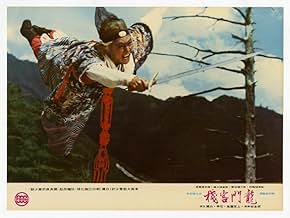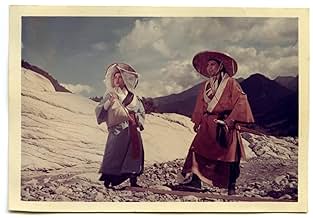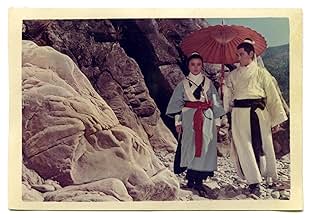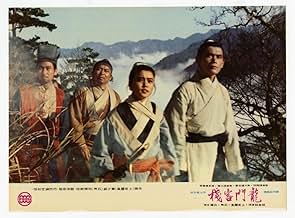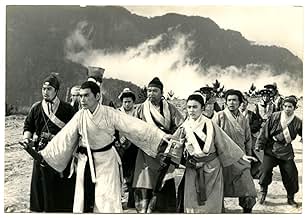VALUTAZIONE IMDb
7,4/10
4002
LA TUA VALUTAZIONE
Aggiungi una trama nella tua linguaWhen the children of an executed General are pursued in 1457 China, some heroic martial arts swordsmen intervene.When the children of an executed General are pursued in 1457 China, some heroic martial arts swordsmen intervene.When the children of an executed General are pursued in 1457 China, some heroic martial arts swordsmen intervene.
- Premi
- 1 vittoria e 1 candidatura in totale
Recensioni in evidenza
It's China in the year 1547. A minister has been executed and his two younger children sent into exile ... officially. The Eunuchs in charge and the bad boys of the Eastern Gate intend to kill them at the Dragon Inn on the border. As they move, however, an assortment of skilled swordsmen (and one swordswoman) show up at the Inn...
King Hu's martial arts movie has nasty villains, loner heroes, magnificent wide-screen Eastmancolor images (restored in 2013) and all sorts of crazy fight sequences in a dazzling array. There seem to be a few plot holes (people keep pausing in their fighting to talk), but that may be a matter of the standards of the Taiwanese cinema as opposed to my more western ideas. What strikes me in the storytelling technique is that the film maker seems to have seen and been influenced by the Man With No Name" trilogy, or at least YOJIMBO and SANJURO, drawing the same conclusions about cinema that Leone had. Chun Shin's character enters the Inn and encounters the agents of the Eastern Gate with the same wry, skilled, deadly sense of humor that Eastwood showed in his performances.
I'm not familiar with Taiwanese film-making of this era and genre. My experience has tended toward the Hong Kong offerings, with an emphasis on the Jacky Chan and Stephen Chow comedies. This is a very impressive introduction to the style and to King Hu
King Hu's martial arts movie has nasty villains, loner heroes, magnificent wide-screen Eastmancolor images (restored in 2013) and all sorts of crazy fight sequences in a dazzling array. There seem to be a few plot holes (people keep pausing in their fighting to talk), but that may be a matter of the standards of the Taiwanese cinema as opposed to my more western ideas. What strikes me in the storytelling technique is that the film maker seems to have seen and been influenced by the Man With No Name" trilogy, or at least YOJIMBO and SANJURO, drawing the same conclusions about cinema that Leone had. Chun Shin's character enters the Inn and encounters the agents of the Eastern Gate with the same wry, skilled, deadly sense of humor that Eastwood showed in his performances.
I'm not familiar with Taiwanese film-making of this era and genre. My experience has tended toward the Hong Kong offerings, with an emphasis on the Jacky Chan and Stephen Chow comedies. This is a very impressive introduction to the style and to King Hu
I speculate that King Hu must have left Shaw Brothers with a bad taste in his mouth after doing "Come Drink With Me". "Come Drink with Me" is also one of the greatest martial arts movies despite having room for improvement. This movie feels to me like King Hu made those improvements in it. I consider this his is his masterpiece. I compare it to the movies of Akira Kurosawa. Too bad that King Hu was nowhere near as prolific. This movie could even be considered his one hit wonder.
King Hu seemed to realize the claustrophobic situation of of the good guys and bad guys face to face in the Dragon Inn was great drama but it had to be contrasted with as much wide open space as possible. In "Dragon Inn" most scenes outside the inn are shot in expansive panoramas. Like Kurosawa, King Hu appreciated the way moving the camera brought the audience into the scene. He used tracking shots, particularly during fight sequences, to get this feeling.
Hang Ying-Chieh gets credit as action coordinator. He was the Big Boss in Bruce Lee's "The Big Boss". Remember when Bruce is cut, wipes off his blood then tastes it? Hang Ying-Chieh does the same here. The sword fights are Japanese style - starting with a suspenseful face off, then a sudden attack to cover the distance, just a few quick strokes of action, then stop and wait a few seconds to feel the results. A real sword cut is initially almost painless so the person cut doesn't know until he sees the effect of the cut.
I rate this as one of the best of 1967 and I recommend it to everyone - not just fans of the genre - to everyone.
King Hu seemed to realize the claustrophobic situation of of the good guys and bad guys face to face in the Dragon Inn was great drama but it had to be contrasted with as much wide open space as possible. In "Dragon Inn" most scenes outside the inn are shot in expansive panoramas. Like Kurosawa, King Hu appreciated the way moving the camera brought the audience into the scene. He used tracking shots, particularly during fight sequences, to get this feeling.
Hang Ying-Chieh gets credit as action coordinator. He was the Big Boss in Bruce Lee's "The Big Boss". Remember when Bruce is cut, wipes off his blood then tastes it? Hang Ying-Chieh does the same here. The sword fights are Japanese style - starting with a suspenseful face off, then a sudden attack to cover the distance, just a few quick strokes of action, then stop and wait a few seconds to feel the results. A real sword cut is initially almost painless so the person cut doesn't know until he sees the effect of the cut.
I rate this as one of the best of 1967 and I recommend it to everyone - not just fans of the genre - to everyone.
I saw this film in the 60's, and have yet to find one to beat it. 'Hidden Dragon, Crouching Tiger' has to come in behind this masterpiece. The use of new actors and actresses, the adoption of well-timed traditional Chinese music, e.g. to usher in the villain, the innovative action sequence in sword fights, all added to the brilliance of this film.
Yes, there are shortcomings. Toward the end, and the climax, the anti-gravity leaps to the trees were overdone and unnecessary. Regardless, this film resembles the best of the traditional, addictive Chinese martial art novels that once consumed many hours of the armchair martial art addicts.
Yes, there are shortcomings. Toward the end, and the climax, the anti-gravity leaps to the trees were overdone and unnecessary. Regardless, this film resembles the best of the traditional, addictive Chinese martial art novels that once consumed many hours of the armchair martial art addicts.
10wataru-7
There are some movies that stick by you over the years and this Chinese swords movie from the middle sixties is one of them.
King Hu's Dragon Gate Inn has all the ingredients in it to make this movie a classic. Not only does it have good swords fights and combines these with an excellent story and plot but on a more subtle level the background music adds a really good atmosphere to it that draws you even more into the movie and story.
I can recommend this movie for anyone who is interested in Chinese film in general and anyone who is interested in Chinese swords movies with a good story and plot.
10 out of 10 points from me.
King Hu's Dragon Gate Inn has all the ingredients in it to make this movie a classic. Not only does it have good swords fights and combines these with an excellent story and plot but on a more subtle level the background music adds a really good atmosphere to it that draws you even more into the movie and story.
I can recommend this movie for anyone who is interested in Chinese film in general and anyone who is interested in Chinese swords movies with a good story and plot.
10 out of 10 points from me.
Long considered one of the masterpieces of the wuxia genre King Hu's "Dragon Inn" is a visually superb epic that's closer in tone to Leone than Kurosawa and it features some of the most balletic fight sequences in all of cinema. The plot is virtually irrelevant; there are good guys and there are bad guys and that's really all you need to know while even the comedy works beautifully. The action takes place almost entirely around the inn of the title and the film was further immortalised by Ming-liang Tsai when he chose it to be the film screening in the near empty cinema in "Goodbye, Dragon Inn", (they would make a great double-bill). It's been surpassed in people's affections by King Hu's later "A Touch of Zen" but this is arguably more fun and it established Hu as a force to be reckoned with in international cinema, a genre master as well as a great visual stylist. Wonderful.
Lo sapevi?
- QuizDirector King Hu encouraged his martial arts choreographers to draw from the alternately fluid and rhythmic movements of Chinese opera. Rather than resorting to fast or slow motion, footage printed backward, animation, or other early special-effects techniques, the filmmaker relied as much as possible on the actual skills of his performers and on the magic of editing.
- ConnessioniFeatured in Goodbye, Dragon Inn (2003)
I più visti
Accedi per valutare e creare un elenco di titoli salvati per ottenere consigli personalizzati
- How long is Dragon Inn?Powered by Alexa
Dettagli
Contribuisci a questa pagina
Suggerisci una modifica o aggiungi i contenuti mancanti


